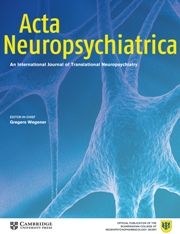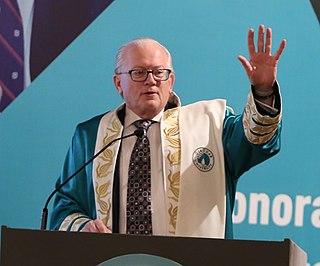
Alois Alzheimer was a German psychiatrist and neuropathologist and a colleague of Emil Kraepelin. Alzheimer is credited with identifying the first published case of "presenile dementia", which Kraepelin would later identify as Alzheimer's disease.

Apathy is a lack of feeling, emotion, interest, or concern about something. It is a state of indifference, or the suppression of emotions such as concern, excitement, motivation, or passion. An apathetic individual has an absence of interest in or concern about emotional, social, spiritual, philosophical, virtual, or physical life and the world. Apathy can also be defined as a person's lack of goal orientation. Apathy falls in the less extreme spectrum of diminished motivation, with abulia in the middle and akinetic mutism being more extreme than both apathy and abulia.
Neuropsychiatry or Organic Psychiatry is a branch of medicine that deals with psychiatry as it relates to neurology, in an effort to understand and attribute behavior to the interaction of neurobiology and social psychology factors. Within neuropsychiatry, the mind is considered "as an emergent property of the brain", whereas other behavioral and neurological specialties might consider the two as separate entities. Neuropsychiatry preceded the current disciplines of psychiatry and neurology, which previously had common training, however, those disciplines have subsequently diverged and are typically practiced separately.
A monothematic delusion is a delusional state that concerns only one particular topic. This is contrasted by what is sometimes called multi-thematic or polythematic delusions where the person has a range of delusions. These disorders can occur within the context of schizophrenia or dementia or they can occur without any other signs of mental illness. When these disorders are found outside the context of mental illness, they are often caused by organic dysfunction as a result of traumatic brain injury, stroke, or neurological illness.
Helen S. Mayberg was born in 1956 in California. She is an American neurologist. Mayberg is known in particular for her work delineating abnormal brain function in patients with major depression using functional neuroimaging. This work led to the first pilot study of deep brain stimulation (DBS), a reversible method of selective modulation of a specific brain circuit, for patients with treatment-resistant depression. As of August 2019, she has published 211 original peer-reviewed articles, 31 books and book chapters, and acted as principal investigator on 24 research grants. Mayberg is coinventor with Andres Lozano of “Method for Treating Depression Mood Disorders and Anxiety Disorders using Neuromodulation,” US patent 2005/0033379A1. St. Jude Medical Neuromodulation licensed her intellectual property to develop Subcallosal Cingulate Deep Brain Stimulation for Treatment-Resistant Unipolar and Bipolar Depression for the treatment of severe depression. As of 2018, Mayberg holds positions as Professor of Neurology and Neurosurgery and Professor, Psychiatry and Neuroscience, both at Mount Sinai Medical School, and Professor of Psychiatry, Emory University; Emory University Hospital. Since 2018, she has served as Director, Nash Family Center for Advanced Circuit Therapeutics at the Icahn School of Medicine at Mount Sinai.
Paradoxical laughter is an exaggerated expression of humour which is unwarranted by external events. It may be uncontrollable laughter which may be recognised as inappropriate by the person involved. It is associated with altered mental states or mental illness, such as mania, hypomania or schizophrenia, and can have other causes.
Trevor William Robbins CBE FRS FMedSci is a Professor of cognitive neuroscience and former Head of the Department of Psychology at the University of Cambridge. Robbins interests are in the fields of cognitive neuroscience, behavioural neuroscience and psychopharmacology.
Primary and secondary brain injury are ways to classify the injury processes that occur in brain injury. In traumatic brain injury (TBI), primary brain injury occurs during the initial insult, and results from displacement of the physical structures of the brain. Secondary brain injury occurs gradually and may involve an array of cellular processes. Secondary injury, which is not caused by mechanical damage, can result from the primary injury or be independent of it. The fact that people sometimes deteriorate after brain injury was originally taken to mean that secondary injury was occurring. It is not well understood how much of a contribution primary and secondary injuries respectively have to the clinical manifestations of TBI.

Gevotroline (WY-47,384) is an atypical antipsychotic with a tricyclic structure which was under development for the treatment of schizophrenia by Wyeth-Ayerst. It acts as a balanced, modest affinity D2 and 5-HT2 receptor antagonist and also possesses high affinity for the sigma receptor. It was well tolerated and showed efficacy in phase II clinical trials but was never marketed.
Perminder Sachdev is an Indian neuropsychiatrist based in Australia. He is a professor of neuropsychiatry at the University of New South Wales (UNSW), co-director of the UNSW Centre for Healthy Brain Aging, and clinical director of the Neuropsychiatric Institute at the Prince of Wales Hospital, Sydney. He is considered a trailblazer in the field of neuropsychiatry. Sachdev's research interests include ageing, vascular cognitive disorders such as vascular dementia, and psychiatric disorders.
The American Neuropsychiatric Association (ANPA) is a non-profit organization of professionals in neuropsychiatry, behavioral neurology and the clinical neurosciences, with over 700 members from around the world. Established in 1988, its mission is to improve the lives of people with disorders at the interface of psychiatry and neurology, with the vision of transforming recognition, understanding and treatment of neuropsychiatric disorders. It founded in 1988 by two academic physicians doubly certified in neurology and psychiatry, Barry S. Fogel and Randolph Schiffer.

Acta Neuropsychiatrica is a bimonthly peer-reviewed medical journal covering research in neuropharmacology, neuropsychiatry, and neuroscience relevant to the pathophysiology, neurobiology, and treatment of neuropsychiatric disorders
Extended reality (XR) is a catch-all term to refer to augmented reality (AR), virtual reality (VR), and mixed reality (MR). The technology is intended to combine or mirror the physical world with a "digital twin world" able to interact with it.

Lithium toxicity, also known as lithium overdose, is the condition of having too much lithium. Symptoms may include a tremor, increased reflexes, trouble walking, kidney problems, and an altered level of consciousness. Some symptoms may last for a year after levels return to normal. Complications may include serotonin syndrome.

Barry S. Fogel is an American neuropsychiatrist, behavioral neurologist, medical writer, medical educator and inventor. He is the senior author of a standard text in neuropsychiatry and medical psychiatry, and a founder of the American Neuropsychiatric Association and the International Neuropsychiatric Association.

Dr. Stephen Stahl, MD, PhD, is an accomplished author and Professor of Psychiatry who specializes in psychopharmacology. He currently holds the position of Professor at the University of California, San Diego and at the University of California Riverside and serves as an Honorary Fellow in the psychiatry department at the University of Cambridge. In addition, he is the chairman of Neuroscience Education Institute (NEI) and Arbor Scientia Group. Dr. Stahl also serves as an Editor-in-chief of CNS Spectrums. He has authored over 600 articles and chapters, with an H-index of 72, and has given more than 2,000 scientific presentations and abstracts. Dr. Stahl is an internationally renowned clinician, researcher, and teacher in psychiatry with subspecialty expertise in psychopharmacology. Dr. Stahl has also published a novel, Shell Shock, and a biography of Nicola Tesla. His lectures, courses, and preceptorships based upon his textbooks have taken him to dozens of countries on six continents. His books have sold over a million copies, and his lectures and scientific presentations have been distributed in many different languages to hundreds of thousands of professionals.
Ramdas Ransing is an Indian psychiatrist and researcher Mahatma Gandhi Institute of Medical Sciences, MGIMS best known for his work in Neuropsychiatry. He is a co-founder of the Pasay Foundation, an NGO dedicated to research in the fields of deaddiction and psychiatric work.
Constantine G. Lyketsos is the Elizabeth Plank Althouse Professor in Alzheimer's Disease Research in the Department of Psychiatry and Behavioral Sciences at the Johns Hopkins University, Baltimore, Maryland, United States. He is the founding director of the Richman Family Precision Medicine Center of Excellence in Alzheimer's Disease, and an associate director of the Johns Hopkins Alzheimer's Disease Research Center (ADRC).
Una D. McCann is a board certified psychiatrist and researcher at Johns Hopkins School of Medicine in the Department of Psychiatry. She is also the Director of the Anxiety Disorders Program, and Co-Director of the Center for Interdisciplinary Sleep Medicine and Research, and Associate Program Director at the Johns Hopkins Bayview Medical Center. McCann is considered to be an expert in anxiety and stress disorders and her primary areas research revolves around amphetamine-induced monoamine neurotoxicity and neurobiology of anxiety disorders.
Rehabilitation after COVID-19 is needed in individuals experiencing longer-term disabling illness at any stage of COVID-19 infection. The rehabilitation of individuals with COVID-19 includes screening for the need for rehabilitation, participation of a multi-disciplinary team to evaluate and manage the individual's disabilities, use of four evidence based classes for rehabilitation, as well as individualised interventions for other problems.






